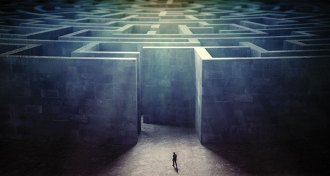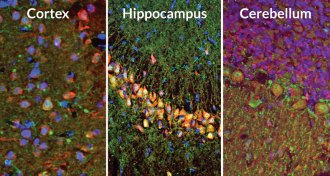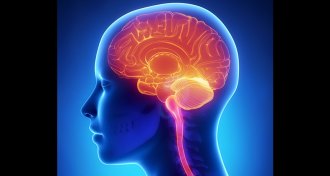Neuroscience
-
 Neuroscience
NeuroscienceSigns of Alzheimer’s seen in young brain’s GPS cells
Signs of Alzheimer’s can show up in the brain’s compass decades before symptoms strike.
By Meghan Rosen -
 Physics
PhysicsPentaquarks, locked-in syndrome and more reader feedback
Readers discuss pentaquark sightings, delightful diatoms and whether an ancient four-legged fossil was actually a snake.
-
 Neuroscience
NeuroscienceNets full of holes catch long-term memories
Tough structures that swaddle nerve cells may store long-term memories.
-
 Neuroscience
NeuroscienceSex influences ability to assess crowd’s emotion
New analyses explain how people detect an angry mob or a happy party.
-
 Neuroscience
NeuroscienceHigh-fat diet’s negative effect on memory may fade
Brain may find way to compensate for memory impairments linked to high-fat diets, study in rats shows.
By Susan Gaidos -
 Health & Medicine
Health & MedicineHollywood-made science documentary series comes to TV
Breakthrough series gives a closer look at scientists at work.
-
 Neuroscience
NeuroscienceMultitaskers do worse on tasks that require focus
Multitasking is more likely to impair teens’ focusing ability than improve it, study testing attention skills finds.
By Susan Gaidos -
 Neuroscience
NeuroscienceSigns of Huntington’s show up in the brain in childhood
Hints of Huntington’s disease show up in the brain long before symptoms do.
-
 Neuroscience
NeuroscienceAdolescent brains open to change
Adolescent brains are still changing, a malleability that renders them particularly sensitive to the outside world.
-
 Neuroscience
NeuroscienceThat familiar feeling comes from deep in the brain
Knowing what’s new and what we’ve seen before is at the base of memory. A new study shows that with a flash of light, scientists can change the firing of brain cells, and make the old new again.
-
 Health & Medicine
Health & MedicineWeight and sun exposure linked to onset of multiple sclerosis
Among people with multiple sclerosis, those with higher body mass and lower adolescent sun exposure tended to be diagnosed with the disease at an earlier age, a new study suggests.
-
 Neuroscience
NeuroscienceKavli Foundation gives more money for the brain
The Kavli Foundation will provide $100 million toward solving the mysteries of the brain.